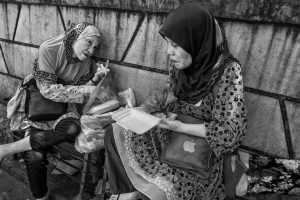In this third installment of our series on vocation, Makram El-Amin, imam at Masjid An-Nur in Minneapolis, discusses calling and vocation from a Muslim perspective. Diane Millis, interviewer from the Lives Explored video project, sat down with Makram and other leaders from various faith traditions to discuss these concepts as featured in Calling in Today’s World: Voices from Eight Faith Perspectives (Eerdmans, 2016). You can read previous interviews on Judaism and Buddhism here.
How does the Islamic tradition think about vocation and calling?
There may be varying opinions on Islam’s concept of vocation and calling. But when I think about a calling, I think about something that is a gift given to you by God. Perhaps you don’t always know it; perhaps it’s your life’s purpose to come to know it. But when you do come to know it, to deny it would be a very painful process. This gift that God plants in you is like a life germ that begins to motivate you, and in some cases agitate you, to move beyond your present circumstances until you move into the space that aligns your soul and your spirit.
God says in our Holy Book the Quran that “To each is a goal to which God turns him. Then strive as in a race towards all that is good, and wherever you are, God will bring you together.” So it is very specific that God has given a gift to each and every one of us. Our job is to use our gifts in a good way: to take that which comes naturally and use it for good. I think that everyone possesses this; it is not something that has been reserved for people of faith.
What kind of language would you use to describe a sense of calling in Islam?
We might use different terminology, but we’ll be aiming at the same concept. For me, this is all about what we would call your Deen in Islam—which is translated to mean “religion,” but is more fully understood as your way of life. Within your way of being, you make choices on what you do and do not prioritize, and your actions and activities will follow. Part of the struggle is to keep our Deen pure, because there are many distractions that would take us away from being our best self. But this way of life—how I see myself and how I relate to the world and God—all these concepts are found throughout Islamic tradition.
What habits or practices are related to this sense of Deen?
For me as a Muslim, what keeps me grounded in that way of life is what we would consider our five pillars. First is the testimony that we witness God as one, and we witness that Muhammad is the messenger of God. This is the premise in Islam that all else unfolds from: the oneness of God, the unity of God and the unity of matter and humanity. Everything is interconnected and interdependent. Nothing stands alone, even though it may appear that way; it is part of a single plan of God, that the Universe is like one verse or one sign for us.
Second, Muhammad is a messenger of God, a human being. He is not one to be worshipped, but has the same potential and frailties as all human beings. So we emulate his life because he is human. When we are viewing him or studying him, what we are actually seeing is our best self. So we look to embrace these ideas. Part of the struggle—the real Jihad in the classic sense of that term—is to be your best self that God would be pleased with. So it’s an internal movement, the struggle within yourself to be better.
It also involves our five daily prayers. It takes a strong inner constitution to leave your bed at night when the world is sleeping and pray to God before the sun comes up. Throughout specific times of the day we have to break away and give that time to God. Because within our scripture, God says, “Remember me and I’ll remember you.”
So these are ways that we try to keep our Deen: prayer, fasting, the month of Ramadan, charity, and the haj—to make the pilgrimage one time in our life. This is about connecting back with all of humanity. No matter where we come from, what language we use, what food we prefer or dress we wear—we are all one before God. These are the movements and the callings that keep us in that space.
For more from Makram, watch his Lives Explored story and companion videos for the new book from the Interfaith Perspectives on Vocation seminar, Calling in Today’s World: Voices from Eight Faith Perspectives (Eerdmans, 2016).
Like this post? Subscribe to have new posts sent to you by email the same day they are posted.




Hey, thanks for this article. I am currently in dillema because I want to become Islam but my parents against it. Even if this article doesn’t solve my problem, it makes me inspired. Thanks again
May allah giude you to the happiness in here and heavens and safety in here after!
May Allah accept all of us for Islam. and grant us the grace to follow the path shown by Islam.